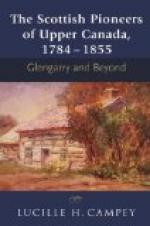A favourite game amongst the Ojibwe is described as “the hurdle”, which is another name for the Canadian national game of La Crosse. When about to play, the men, of all ages, would strip themselves almost naked, but dress their hair in great style, put ornaments on their arms, and belts round their waists, and paint their faces and bodies in the most elaborate style. Each man was provided with “a hurdle”, an instrument made of a small stick of wood about three feet long, bent at the end to a small circle, in which a loose piece of network is fixed, forming a cavity big enough to receive a leather ball about the size of a man’s fist. Everything being prepared, a level plain about half a mile long was chosen, with proper barriers or goals at each end. Having previously formed into two equal parts, they assembled in the very middle of the field, and the game began by throwing up the ball perpendicularly in the air, when instantly both parties (writes an eyewitness) “formed a singular group of naked men, painted in different colours and in the most comical attitudes imaginable, holding their rackets elevated in the air to catch the ball”. Whoever was so fortunate as to catch it in his net ran with it to the barrier with all his might, supported by his party; whilst the opponents were pursuing and endeavouring to knock the ball out of the net. He who succeeded in doing so ran in the same manner towards the opposite barrier, and was, of course, pursued in his turn. If in danger of being overtaken, he might throw it with his hurdle towards any of his associates who happened to be nearer the barrier than himself. They had a particular knack of throwing it a great distance in this manner, so that the best runners had not always the advantage; and, by a peculiar way of working their hands and arms while running, the ball never dropped out of their “hurdle”.
“The best of three heats wins the game, and, besides the honour acquired on such occasions, a considerable prize is adjudged to the victors. The vanquished, however, generally challenge their adversaries to renew the game the next day, which is seldom refused. The game then becomes more important, as the honour of the whole village is at stake, and it is carried on with redoubled impetuosity, every object which might impede them in their career is knocked down and trodden under foot without mercy, and before the game is decided, it is a common thing to see numbers sprawling on the ground with wounded legs and broken heads, yet this never creates any disputes or ill-will after the play is decided” (Alexander Henry, sen.).




